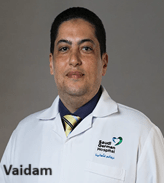Aortic Valve Replacement (AVR) is a surgical procedure in which the failing aortic valve of a patient's heart is replaced with an artificial heart valve.
Aortic Valve Replacement may be done through -
The overall cost of the procedure also varies based on the patient's condition and preferences. Some of these factors are:
A day before the surgery, a physical examination of the person and some tests are done to assess one’s health, including chest X-ray, electrocardiogram (ECG), blood tests, echocardiogram, and coronary angiogram. All the tests are usually covered in the medical package.
There are different types of valves used for aortic valve surgery depending upon the patient’s condition. These include Open Aortic Valve Replacement (AVR) via Sternotomy, Transcatheter Aortic Valve Implantation (TAVI), and Minimally Invasive Cardiac Surgery (MICS). AVR is for low-risk patients, TAVI is used for patients who are at risk from complications of AVR whereas MICS is a fast method among all three. However, the most expensive procedure among all the three is TAVI.
In addition, AVR and MICS can last up to a lifetime and TAVI has a life span of approximately five years but more research is required on it.
All the pharmaceutical expenses and medical consumables are included in the medical package during the patient’s stay in the hospital however, these benefits are not covered once the patient is discharged.
Popular Cities in Egypt for Aortic Valve Replacement are:
Listing popular specialists:

Senior Registrar, 24 years of experience

Aortic surgery, Valve surgery, Thoracic trauma, Lung cancer surgery
Most people do well with this surgery. Like any operation, though, it can lead to problems, possible risks after AVR may include
Our Services for Aortic Valve Replacement in Egypt
Transparent - Professional - Without Hassles






NABH Certified Healthcare Discovery Platform
Vaidam is NABH certified healthcare discovery platform that will connect you to top-notch medical experts, hospitals, wellness options, and trusted travel partners to help identify and make the right healthcare choices.

Researched & Personalized Treatment Plan - Under One Roof
You can search for the best hospitals, read about them, view photographs of the facilities at the hospitals and the places at which the hospitals are located, and check the cost of treatment.

Quality Treatment Within Your Budget
As soon as you post an enquiry, the patient relation team will collect details from you, share them with the doctors and hospitals on Vaidam's panel, and get a personalized treatment plan. We research to get quality treatment within your budget.

Treatment to Travel
Vaidam concierge assists patients, to get medical Visa, the best airline fares and arrangements for your stay. Our concierge also helps you with daily travel, language, and food concerns. Vaidam does everything to be your perfect host. All of Vaidam’s services are free of cost to patients.

International Reach
Vaidam Health has network in 15+ countries, which includes India, Turkey, UAE, Germany, South Korea, Thailand, Malaysia, Spain.
Note: Vaidam Health does not provide medical advice, diagnosis or treatment. The services and information offered on www.vaidam.com are intended solely for informational purposes and cannot replace the professional consultation or treatment by a physician. Vaidam Health discourages copying, cloning of its webpages and its content and it will follow the legal procedures to protect its intellectual property